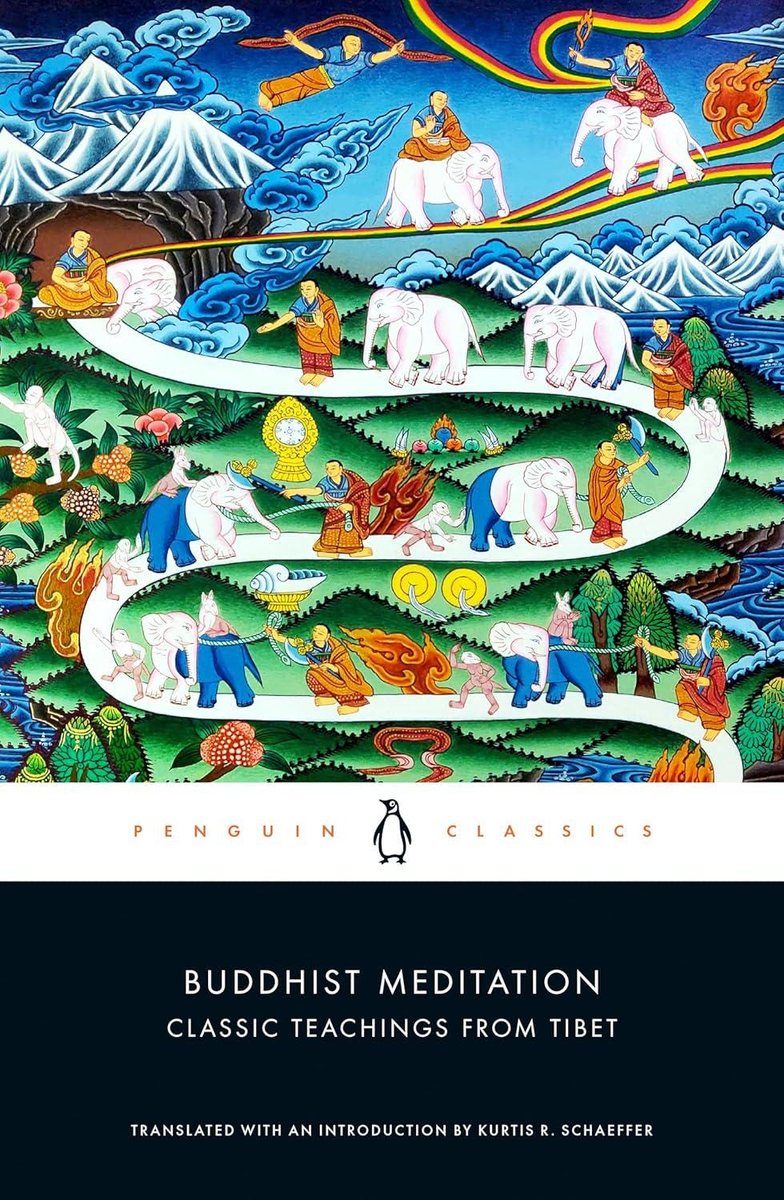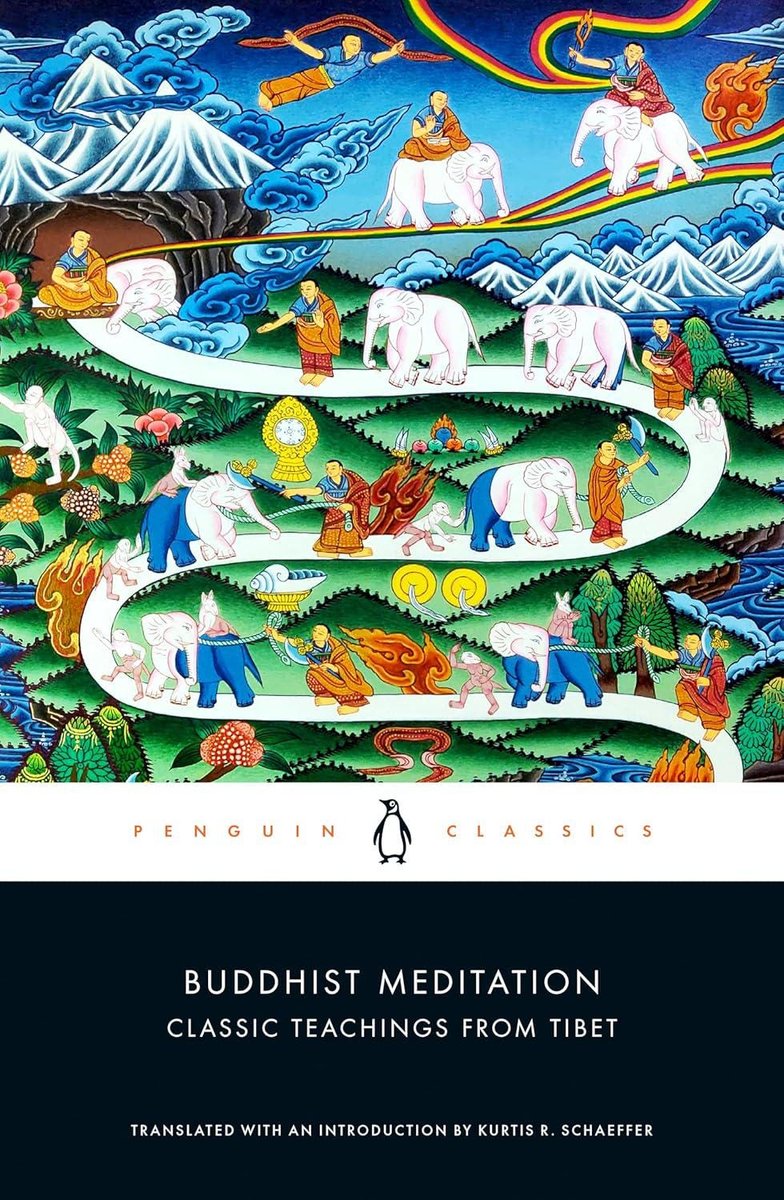Buddhist Meditation: Classic Teachings from Tibet
$29.99
Buddhist Meditation: Classic Teachings from Tibet
Contributor(s): Schaeffer, Kurtis R (Translator) , Schaeffer, Kurtis R (Introduction by)
Publisher: Penguin Classics
ISBN: 0143111469
Physical Info: 0.8" H x 7.7" L x 5.1" W (0.45 lbs) 256 pages
A Tibetan Buddhist anthology of accessible and authentic contemplative exercises to help cultivate innate yet undeveloped powers of mind, emotion, and body. A Penguin Classic Drawn from Tibet's rich contemplative literature, Buddhist Meditation offers classic exercises focused on the opportunities and challenges of life; cultivating inner calm; fostering a wider perspective on oneself in relationship to others; working with negative emotions, and the highest values of the Buddhist tradition, love and compassion. Several dozen meditation instructions are collected in twelve chapters. All major traditions of Tibetan Buddhism are represented. The book is structured on foundation practices, practice manuals that immerse the reader in the search for meaningful and compassionate responses to the ubiquity of human suffering, and in the contemplative techniques that translate that search into consequential action. Spiritual exercises introduce: 1) the opportunity for self-betterment and to be of benefit to other living beings: 2) the inescapable persistence of suffering in life, and the reality of death: 3) the workings of ethical cause and effect, otherwise known as karma and: 4) the ever-repeating succession of frustration known as cyclic existence, or samsara. The second set of foundation practices provide tools to build upon including: 5) taking refuge in Buddhism-a deep formal commitment to integrate Buddhist contemplative and ethical teachings into one's life: 6) cultivating love and compassion for all living beings: 7) clearing away cognitive, emotional, and behavioral impediments to actualizing love and compassion: 8) developing with wisdom and the experience and excellent qualities necessary to put love and compassion into practice and 9) dedicating oneself to a spiritual mentor to serve as a guide through this intensive program of training. Part existential philosophy, part ethics, part self-help program, part cosmology-the foundation exercises present a complete Buddhist picture of life, the ethical universe, and the first steps in making a positive impact in life for ourselves and others, steps anyone can begin to take by dedicating themselves to train in contemplative exercises. Provided by publisher.
Brief Description:
A Tibetan Buddhist anthology of accessible and authentic contemplative exercises to help cultivate innate yet undeveloped powers of mind, emotion, and body. A Penguin Classic Drawn from Tibet's rich contemplative literature, Buddhist Meditation offers classic exercises focused on the opportunities and challenges of life; cultivating inner calm; fostering a wider perspective on oneself in relationship to others; working with negative emotions, and the highest values of the Buddhist tradition, love and compassion. Several dozen meditation instructions are collected in twelve chapters. All major traditions of Tibetan Buddhism are represented. The book is structured on foundation practices, practice manuals that immerse the reader in the search for meaningful and compassionate responses to the ubiquity of human suffering, and in the contemplative techniques that translate that search into consequential action. Spiritual exercises introduce: 1, the opportunity for self-betterment and to be of benefit to other living beings: 2, the inescapable persistence of suffering in life, and the reality of death: 3, the workings of ethical cause and effect, otherwise known as karma and: 4, the ever-repeating succession of frustration known as cyclic existence, or samsara. The second set of foundation practices provide tools to build upon including: 5, taking refuge in Buddhism-a deep formal commitment to integrate Buddhist contemplative and ethical teachings into one's life: 6, cultivating love and compassion for all living beings: 7, clearing away cognitive, emotional, and behavioral impediments to actualizing love and compassion: 8, developing with wisdom and the experience and excellent qualities necessary to put love and compassion into practice and 9, dedicating oneself to a spiritual mentor to serve as a guide through this intensive program of training. Part existential philosophy, part ethics, part self-help program, part cosmology-the foundation exercises present a complete Buddhist picture of life, the ethical universe, and the first steps in making a positive impact in life for ourselves and others, steps anyone can begin to take by dedicating themselves to train in contemplative exercises. Provided by publisher.
Biographical Note:
Kurtis R. Schaeffer is Frances Myers Ball Professor at The University of Virginia. He is the author or editor of several books including Life of the Buddha by Tenzel Chogyel (Penguin Classics 2015). He is co-director of The Religion, Race and Democracy Lab at the University of Virginia and co-host of the Sacred & Profane. He is series editor of The Lives of the Masters for Shambhala.
Publisher Marketing:
A Tibetan Buddhist anthology of accessible and authentic contemplative exercises to help cultivate innate yet undeveloped powers of mind, emotion, and body.
A Penguin Classic
Drawn from Tibet's rich contemplative literature, Buddhist Meditation offers classic exercises focused on the opportunities and challenges of life; cultivating inner calm; fostering a wider perspective on oneself in relationship to others; working with negative emotions, and the highest values of the Buddhist tradition, love and compassion. Several dozen meditation instructions are collected in twelve chapters. All major traditions of Tibetan Buddhism are represented. The book is structured on "foundation practices", practice manuals that immerse the reader in the search for meaningful and compassionate responses to the ubiquity of human suffering, and in the contemplative techniques that translate that search into consequential action.
Spiritual exercises introduce 1) the opportunity for self-betterment and to be of benefit to other living beings; 2) the inescapable persistence of suffering in life, and the reality of death; 3) the workings of ethical cause and effect, otherwise known as karma; and 4) the ever-repeating succession of frustration known as cyclic existence, or samsara. The second set of foundation practices provide tools to build upon including: 5) taking refuge in Buddhism--a deep formal commitment to integrate Buddhist contemplative and ethical teachings into one's life; 6) cultivating love and compassion for all living beings; 7) clearing away cognitive, emotional, and behavioral impediments to actualizing love and compassion; 8) developing with wisdom and the experience and excellent qualities necessary to put love and compassion into practice; and 9) dedicating oneself to a spiritual mentor to serve as a guide through this intensive program of training.
Part existential philosophy, part ethics, part self-help program, part cosmology--the foundation exercises present a complete Buddhist picture of life, the ethical universe, and the first steps in making a positive impact in life for ourselves and others, steps anyone can begin to take by dedicating themselves to train in contemplative exercises.
Contributor(s): Schaeffer, Kurtis R (Translator) , Schaeffer, Kurtis R (Introduction by)
Publisher: Penguin Classics
ISBN: 0143111469
Physical Info: 0.8" H x 7.7" L x 5.1" W (0.45 lbs) 256 pages
A Tibetan Buddhist anthology of accessible and authentic contemplative exercises to help cultivate innate yet undeveloped powers of mind, emotion, and body. A Penguin Classic Drawn from Tibet's rich contemplative literature, Buddhist Meditation offers classic exercises focused on the opportunities and challenges of life; cultivating inner calm; fostering a wider perspective on oneself in relationship to others; working with negative emotions, and the highest values of the Buddhist tradition, love and compassion. Several dozen meditation instructions are collected in twelve chapters. All major traditions of Tibetan Buddhism are represented. The book is structured on foundation practices, practice manuals that immerse the reader in the search for meaningful and compassionate responses to the ubiquity of human suffering, and in the contemplative techniques that translate that search into consequential action. Spiritual exercises introduce: 1) the opportunity for self-betterment and to be of benefit to other living beings: 2) the inescapable persistence of suffering in life, and the reality of death: 3) the workings of ethical cause and effect, otherwise known as karma and: 4) the ever-repeating succession of frustration known as cyclic existence, or samsara. The second set of foundation practices provide tools to build upon including: 5) taking refuge in Buddhism-a deep formal commitment to integrate Buddhist contemplative and ethical teachings into one's life: 6) cultivating love and compassion for all living beings: 7) clearing away cognitive, emotional, and behavioral impediments to actualizing love and compassion: 8) developing with wisdom and the experience and excellent qualities necessary to put love and compassion into practice and 9) dedicating oneself to a spiritual mentor to serve as a guide through this intensive program of training. Part existential philosophy, part ethics, part self-help program, part cosmology-the foundation exercises present a complete Buddhist picture of life, the ethical universe, and the first steps in making a positive impact in life for ourselves and others, steps anyone can begin to take by dedicating themselves to train in contemplative exercises. Provided by publisher.
Brief Description:
A Tibetan Buddhist anthology of accessible and authentic contemplative exercises to help cultivate innate yet undeveloped powers of mind, emotion, and body. A Penguin Classic Drawn from Tibet's rich contemplative literature, Buddhist Meditation offers classic exercises focused on the opportunities and challenges of life; cultivating inner calm; fostering a wider perspective on oneself in relationship to others; working with negative emotions, and the highest values of the Buddhist tradition, love and compassion. Several dozen meditation instructions are collected in twelve chapters. All major traditions of Tibetan Buddhism are represented. The book is structured on foundation practices, practice manuals that immerse the reader in the search for meaningful and compassionate responses to the ubiquity of human suffering, and in the contemplative techniques that translate that search into consequential action. Spiritual exercises introduce: 1, the opportunity for self-betterment and to be of benefit to other living beings: 2, the inescapable persistence of suffering in life, and the reality of death: 3, the workings of ethical cause and effect, otherwise known as karma and: 4, the ever-repeating succession of frustration known as cyclic existence, or samsara. The second set of foundation practices provide tools to build upon including: 5, taking refuge in Buddhism-a deep formal commitment to integrate Buddhist contemplative and ethical teachings into one's life: 6, cultivating love and compassion for all living beings: 7, clearing away cognitive, emotional, and behavioral impediments to actualizing love and compassion: 8, developing with wisdom and the experience and excellent qualities necessary to put love and compassion into practice and 9, dedicating oneself to a spiritual mentor to serve as a guide through this intensive program of training. Part existential philosophy, part ethics, part self-help program, part cosmology-the foundation exercises present a complete Buddhist picture of life, the ethical universe, and the first steps in making a positive impact in life for ourselves and others, steps anyone can begin to take by dedicating themselves to train in contemplative exercises. Provided by publisher.
Biographical Note:
Kurtis R. Schaeffer is Frances Myers Ball Professor at The University of Virginia. He is the author or editor of several books including Life of the Buddha by Tenzel Chogyel (Penguin Classics 2015). He is co-director of The Religion, Race and Democracy Lab at the University of Virginia and co-host of the Sacred & Profane. He is series editor of The Lives of the Masters for Shambhala.
Publisher Marketing:
A Tibetan Buddhist anthology of accessible and authentic contemplative exercises to help cultivate innate yet undeveloped powers of mind, emotion, and body.
A Penguin Classic
Drawn from Tibet's rich contemplative literature, Buddhist Meditation offers classic exercises focused on the opportunities and challenges of life; cultivating inner calm; fostering a wider perspective on oneself in relationship to others; working with negative emotions, and the highest values of the Buddhist tradition, love and compassion. Several dozen meditation instructions are collected in twelve chapters. All major traditions of Tibetan Buddhism are represented. The book is structured on "foundation practices", practice manuals that immerse the reader in the search for meaningful and compassionate responses to the ubiquity of human suffering, and in the contemplative techniques that translate that search into consequential action.
Spiritual exercises introduce 1) the opportunity for self-betterment and to be of benefit to other living beings; 2) the inescapable persistence of suffering in life, and the reality of death; 3) the workings of ethical cause and effect, otherwise known as karma; and 4) the ever-repeating succession of frustration known as cyclic existence, or samsara. The second set of foundation practices provide tools to build upon including: 5) taking refuge in Buddhism--a deep formal commitment to integrate Buddhist contemplative and ethical teachings into one's life; 6) cultivating love and compassion for all living beings; 7) clearing away cognitive, emotional, and behavioral impediments to actualizing love and compassion; 8) developing with wisdom and the experience and excellent qualities necessary to put love and compassion into practice; and 9) dedicating oneself to a spiritual mentor to serve as a guide through this intensive program of training.
Part existential philosophy, part ethics, part self-help program, part cosmology--the foundation exercises present a complete Buddhist picture of life, the ethical universe, and the first steps in making a positive impact in life for ourselves and others, steps anyone can begin to take by dedicating themselves to train in contemplative exercises.




